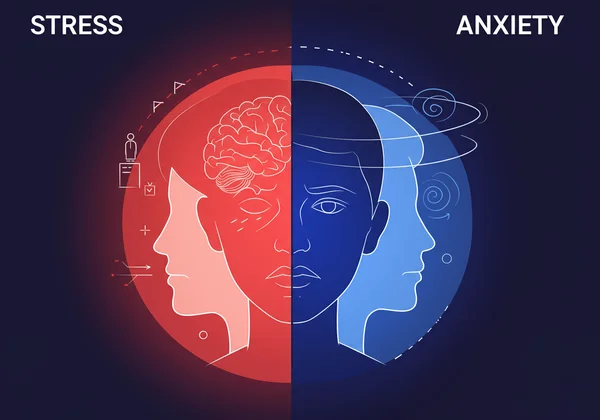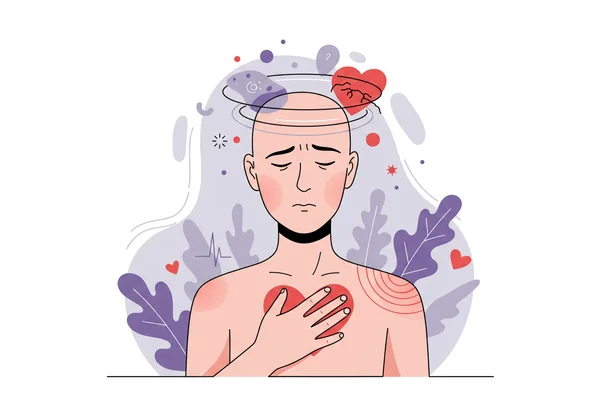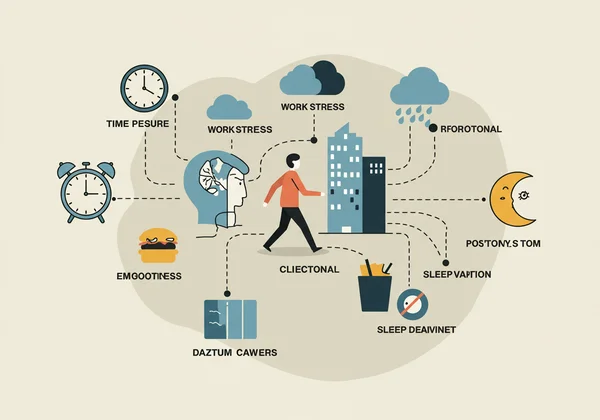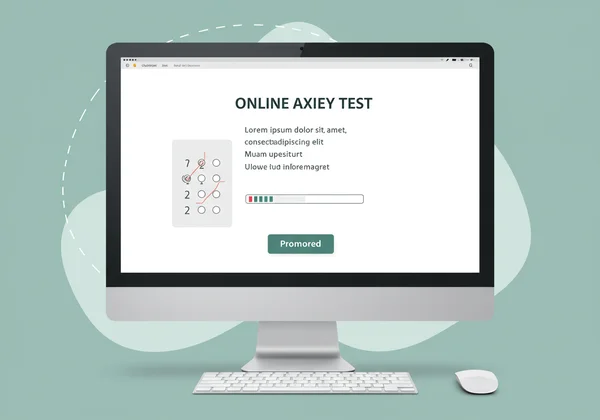Do I Have Anxiety? Symptoms, Causes, & How a Confidential Anxiety Test Can Help
July 13, 2025 | By Isla Caldwell
Feeling overwhelmed or constantly worried? Many of us experience moments of stress, but distinguishing between everyday worries and clinical anxiety can be challenging. Do I have anxiety or am I just stressed? This guide will help you clearly understand what anxiety truly is, exploring common symptoms, underlying causes, and how it differs from everyday stress. Discover how to recognize anxiety within yourself and take the first step towards better understanding your mental well-being. We offer a safe space to begin your journey.

What are Common Anxiety Symptoms?
Anxiety manifests in various ways, affecting both your body and mind. Recognizing these signs is crucial for self-awareness. It's not just about feeling nervous; anxiety can present as a persistent, overwhelming sense of dread or worry that interferes with daily life. These anxiety symptoms can vary greatly in intensity and frequency, often surprising those who experience them for the first time.
Physical Signs of Anxiety to Watch For
Anxiety often has noticeable physical effects, which can sometimes be mistaken for other health issues. These physical signs are your body's way of reacting to perceived threats, even when none are present. Common bodily reactions include:
-
Heart palpitations or racing heart: Your heart might pound as if you've just run a marathon.
-
Shortness of breath: A feeling of not getting enough air, even when you're not exerting yourself.
-
Sweating: Excessive perspiration, especially when not physically active.
-
Trembling or shaking: Involuntary tremors in your hands, voice, or entire body.
-
Muscle tension: Chronic tightness, particularly in the neck, shoulders, and jaw.
-
Stomach upset: Nausea, stomach aches, or irritable bowel syndrome (IBS) symptoms.
-
Headaches: Often tension headaches, sometimes migraines.
-
Fatigue: Feeling constantly tired, despite getting enough sleep, due to the body being in a constant state of alert.

Emotional & Cognitive Symptoms of Anxiety
Beyond the physical, anxiety deeply impacts your emotional and cognitive states. These emotional symptoms and cognitive symptoms can be just as debilitating, affecting your thoughts, feelings, and ability to concentrate. You might find yourself caught in a cycle of racing thoughts or persistent worries.
- Excessive worry: Persistent, uncontrollable worrying about everyday things, often out of proportion to the actual situation.
- Irritability: Feeling on edge or easily annoyed.
- Restlessness: A feeling of needing to move or being unable to relax.
- Difficulty concentrating: Finding it hard to focus on tasks, conversations, or reading.
- Sleep disturbances: Trouble falling asleep, staying asleep, or experiencing restless sleep.
- Fear or dread: A sense of impending doom or danger, even without a clear reason.
- Feeling overwhelmed: As if there's too much to handle, leading to paralysis.
- Avoidance: Steering clear of situations, places, or activities that trigger anxiety.
What Causes Anxiety? Understanding Potential Triggers
The causes of anxiety are often complex and rarely boil down to one single factor. Instead, it's typically a blend of biological tendencies, life experiences, and environmental influences. Pinpointing these potential triggers can offer valuable insights into how anxiety develops.
Biological & Genetic Factors in Anxiety
Our biology plays a significant role in our susceptibility to anxiety. Research suggests that certain biological factors and genetic factors can increase one's risk. For instance, imbalances in brain chemistry, particularly neurotransmitters like serotonin and norepinephrine, are often implicated. If close family members have experienced anxiety disorders, there might be inherited predispositions that make you more prone to developing similar issues. This doesn't mean anxiety is inevitable, but it does highlight a potential vulnerability.
Environmental, Situational, & Lifestyle Influences
Beyond genetics, our external world and daily habits greatly influence our mental state. Environmental influences such as trauma, chronic stress from work or relationships, or significant life changes (e.g., moving, job loss, bereavement) can trigger or worsen anxiety. Situational influences like financial stress, public speaking, or social gatherings can also be potent catalysts. Furthermore, lifestyle influences such as poor diet, lack of exercise, insufficient sleep, and excessive caffeine or alcohol intake can significantly impact anxiety levels. Addressing these controllable aspects can be a powerful step in managing anxiety.

Anxiety vs. Stress: Key Differences You Need to Know
One of the most common questions people have is how to distinguish anxiety vs. stress. While they often feel similar and share some symptoms, they are fundamentally different. Stress is a normal human reaction to an external demand or threat, while anxiety is often a persistent, excessive worry that can occur without an immediate external trigger. Knowing these distinctions can help you better understand your experiences and decide if you might benefit from an online anxiety test.
When Normal Stress Becomes Clinical Anxiety
Stress is a short-term response to a specific, identifiable stressor. For example, feeling stressed before an exam or a big presentation is a normal and often helpful reaction, sharpening your focus. This is normal stress. However, when this response becomes excessive, disproportionate, and persists even after the stressor is gone, or appears without a clear cause, it may evolve into clinical anxiety. This signifies a deeper, more pervasive state that impacts your ability to function daily. Unlike stress, clinical anxiety can persist for months or even years, profoundly affecting your quality of life.
Duration, Intensity, and Impact: How They Differ
The key to differentiating between anxiety and stress lies in their duration, intensity, and impact.
- Duration: Stress is typically short-lived and resolves once the stressful situation passes. Anxiety, especially an anxiety disorder, can be chronic and long-lasting, persisting even in the absence of a direct threat.
- Intensity: Stress responses are usually proportionate to the stressor. Anxiety can involve intense, overwhelming feelings that feel disproportionate to the actual circumstances, such as a panic attack triggered by a minor inconvenience.
- Impact: While stress can be motivating, extreme or chronic stress can be detrimental. Anxiety, particularly when it becomes a disorder, significantly impairs daily functioning, relationships, work, and overall well-being. It can lead to avoidance behaviors and a reduced quality of life.
Understanding these differences is crucial for self-assessment. If you suspect your feelings go beyond normal stress, considering a professional screening or an initial self-assessment like a free anxiety assessment might be beneficial.
Taking the First Step: Understanding Your Anxiety
Taking action begins with self-awareness. Whether you suspect heightened stress or are grappling with anxiety, choosing to understand your feelings is a powerful act of self-care. This knowledge empowers you to make informed decisions about your well-being.
Our anxiety test platform is designed to be your confidential starting point. We offer a free, anonymous anxiety test based on scientifically validated scales like the GAD-7, providing you with instant insights into your anxiety level. You'll receive a score and initial interpretation, and can even opt for a unique AI-driven analysis for deeper, personalized insights and actionable advice. This tool serves as a confidential screening, offering a clear picture of your current state without needing any personal information or registration. It's completely private and designed to help you quantify your feelings. Take the first step today; your well-being matters. To discover your score and explore personalized insights, take our free test.

Disclaimer: This article is for informational purposes only and does not constitute medical advice. Our test is a screening tool, not a diagnostic instrument. Please consult a qualified healthcare professional for any health concerns.
Frequently Asked Questions About Anxiety
How can I tell if what I'm feeling is anxiety?
It can be challenging to differentiate. If your feelings of worry are persistent, intense, and interfere with your daily life, and you experience physical symptoms like a racing heart, muscle tension, or stomach issues without a clear medical cause, it might be anxiety. Stress is usually a response to a specific, identifiable situation and tends to dissipate once the stressor is gone. If you're unsure, a confidential anxiety quiz can provide initial insights.
Is it normal to feel anxious sometimes?
Yes, absolutely. Everyone experiences moments of worry or nervousness in response to challenging situations, like public speaking or a job interview. This is a normal and often adaptive human emotion. It becomes a concern when these feelings are excessive, persistent, and begin to negatively impact your daily life, leading to distress or impaired functioning.
How accurate are online anxiety tests?
Online anxiety tests, particularly those based on clinically validated scales like the GAD-7, can be quite accurate as screening tools. They are designed to help you identify potential symptoms and quantify their severity, giving you a preliminary anxiety score. However, it’s crucial to remember that they are not diagnostic tools. Only a qualified healthcare professional can provide a diagnosis. Our platform uses trusted scales to give you reliable initial insights, helping you decide if further professional evaluation is warranted. You can discover your results anonymously.
When should I consider taking an anxiety test?
You should consider taking an anxiety test if you've been experiencing persistent worry, nervousness, irritability, or physical symptoms like a racing heart or difficulty sleeping for an extended period (e.g., several weeks or months). If these feelings are impacting your relationships, work, or daily activities, a test can provide a helpful starting point for understanding your mental state. It's a low-barrier, private way to assess your symptoms and decide if you want to explore professional support. Start your free anxiety test today.